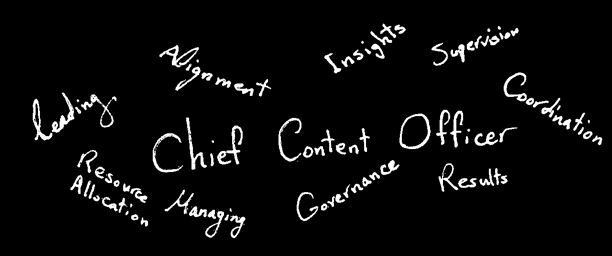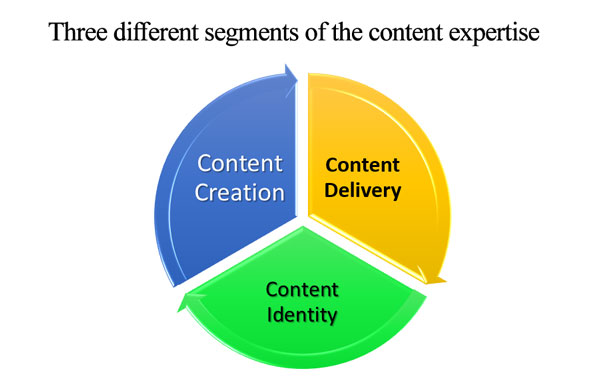Chief Content Officer as a corporate position
The first point we should bear in mind is that the Chief Content Officer or the CCO, like many other C-suite roles, is a corporate position. It means that in a small or medium-sized company, the content strategist or even the content marketer position would be more than enough for handling the content affairs.
- How did the CCO position emerge?
- The best-known drafted job description for CCO position
- My Criticism of the current versions of CCO’s job description
- What does a chief content officer do?
- The Chief Content Officer’s salary
How did the CCO position emerge in the organizational chart?
In the definition of the content strategy, I’ve mentioned some symptoms of the weak content strategy. But listing such symptoms doesn’t help if we can’t hold anyone responsible for solving those problems.
We know that the disagreement about the content issues in the companies is already a major source of conflict in the corporates. This happens because many departments consider themselves as one of the pillars of the content creation and dissemination process and expect to have the loudest voice in the content-relevant decisions:
- Public relations department prefers to oversee every single communication with the outside world. So PR expects to own part of the content strategy pie (preferably the largest pie).
- The marketing department considers itself as the sole department with the ability and knowledge of designing and running advertising campaigns. Campaigns are often the most costly content publication activity ever happens in the content realm. So who will be more competent than marketing department to devise, implement, and supervise the content strategy?
- On the other hand, the accounting and finance department is the only department implicitly allowed to comment on every single decision in the company. Content-related decisions are not an exception.
- The sales department, emphasizing its close touch with the customers, has its own understanding and logic. Armed with many cases and previous experiences, the sales department is able to cast shadows of doubt on every plan not previously checked with it.
- Besides all these challenges and claims, the IT department considers the digital and online activities as its exclusive territory. Therefore, as every comprehensively designed content strategy would include many digital initiatives, the IT department may consider itself as the main player in the field.
In such situations, the emerged content strategy, if you decide to call it a strategy, would not be anything more than a fragmented action plan resulted from power negotiations between various stakeholders with conflicting interests and attitudes toward the content.
This situation is noted in the power school of strategy by Henry Mintzberg in Strategy Safari: Formation of strategy as a result of negotiation between internal and external stakeholders.
The outcome of the strategic planning in such a situation is often not the best strategy for the organization. It’s the strategy of the most powerful, with minor adjustments to keep the other stakeholders silent. This is the point where the necessity of the Chief Content Officer (CCO) role emerges.
The best-known drafted job description for CCO position
ُhe most detailed and elaborated job description for the chief content officer seems to be provided by Content Marketing Institute. However, in my opinion, taking a more detailed look at the document, you will find it closer to an inspiring pool of ideas rather than a practical job description.
Let’s take a look at the brief description of the role:
The Chief Content Officer (CCO) oversees all marketing content initiatives, both internal and external, across multiple platforms and formats to drive sales, engagement, retention, leads and positive customer behavior.
This individual is an expert in all things related to content and channel optimization, brand consistency, segmentation and localization, analytics and meaningful measurement.
The position collaborates with the departments of public relations, communications, marketing, customer service, IT and human resources to help define both the brand story and the story as interpreted by the customer.
Source: Content Marketing Institute
My Criticism of the current versions of CCO’s job description
As I have stated above, the main idea behind the CCO position is to align all content-related efforts and activities, assuring the maximum possible effectiveness and efficiency.
Therefore, it’s understandable that the chief content officer (CCO) has to be able to oversee all the content-related activities and minimize potential conflicts of interests through collaboration with different departments.
However, here lies the central question:
Is it necessary for Chief Content Officer to be jack of all trades or an expert in everything related to the content?
When we talk about the content industry, we are talking about many specialties such as content creation, content curation, content delivery, and content identity development. They are all included in the content industry. However, each one has roots in different sciences:
- Content creation talks about authorship, credibility, and reader engagement.
- Content delivery is a complex bundle of technology, sociology, and psychology.
- Content identity is a territory claimed by many kings including but not limited to branding specialists.
How can a person be an expert in all of them?
The same story happens when you put yourself in the position of Chief Marketing Officer or any other C-Suit position. Is it logical or acceptable for them to be the jack of all trades?
Now, take a second look at the CMI’s definition of Chief Content Officer position mentioned above.
Every job description has to include and exclude at the same time.
It has to include all necessary tasks, duties, and responsibilities related to the position, but avoid defining it in a broad sense so that the position boundaries become blurred.
It’s neither logical nor acceptable for CCO to oversee the whole scope of sales, engagement, retention, lead, and customer behavior.
Therefore, it seems that the most of the CCO job descriptions are overly inclusive and following them may lead to serious organizational conflicts.
By the way, there’s no real boundary between Chief Content Officer (CCO) and Content Strategist in most of the job descriptions.
In many cases, you can change the title of the CCO’s job description to Content Strategist’s job description without any noticeable problem.
What does a chief content officer do?
It seems that the best way to reach a useful job description of the CCO is to take a look at the other C-suite positions (e.g. CFO, CIO, CEO, COO).
There are some elements in common between all CxO positions: Supervision, Coordination, Planning, and Operation:
With the term supervision, we mean supervising all the activities inside the respective territory.
With the term Coordination, we mean collaborating with other departments outside the respective territory.
With the term Planning, we mean macro-planning for the performance indicators inside the territory as well as the contribution to the higher level organizational performance indicators.
With the term Operation, we mean assuring smooth operation of all tasks and activities within the respective territory.
Considering all the points mentioned above, the Chief Content Officer has to supervise, coordinate, and plan to ensure low-friction and high-efficiency of the content-related operations in the Corporate’s Content Machine.
Once more, it’s important to underline that the mentioned duties are mainly administrative and not operational, while a major part of content strategists’ job description is expected to be operational.
All the other positions such as content strategist, content curator, and content creator are line functions with their respective job descriptions, and their tasks should not be included in the job description of the chief content officer. Otherwise, CCO would be considered as an aggressive, useless, territory-builder and conflict-arising position and will never find a respectable seat on the executive board.
Chief Content Officer’s Salary
As I’ve noted before, the Chief Content Officer (CCO) is a new emerging role in today’s organizational charts, and Chief Content Officer’s salary lies on the top of the payroll lists.
Unlike many other job positions which you can check their salary via services like glassdoor and indeed, it’s not so easy to find relevant and helpful details about the chief content officers’ salary and compensation package.
This can be due to the small sample size available or the nature of this job which often push CCO’s to conceal their salaries.
Anyway, here are some points I have found on the web about the salary of such a position:
- According to the comparably, the salaries of the Chief Content Officers in US range from a low of $68K to a high of 230K.
- Glassdoor claims a range of $295K to $318K for the annual package of a CCO in the US. The same website reports an annual salary of £115K – £125K for a chief content officer in the UK.
- Salaryboard, a website dedicated to reporting salaries in Singapore, reports $125K for a CCO with one to three years of experience and $146K for a person with more than 8 years of working experience.








